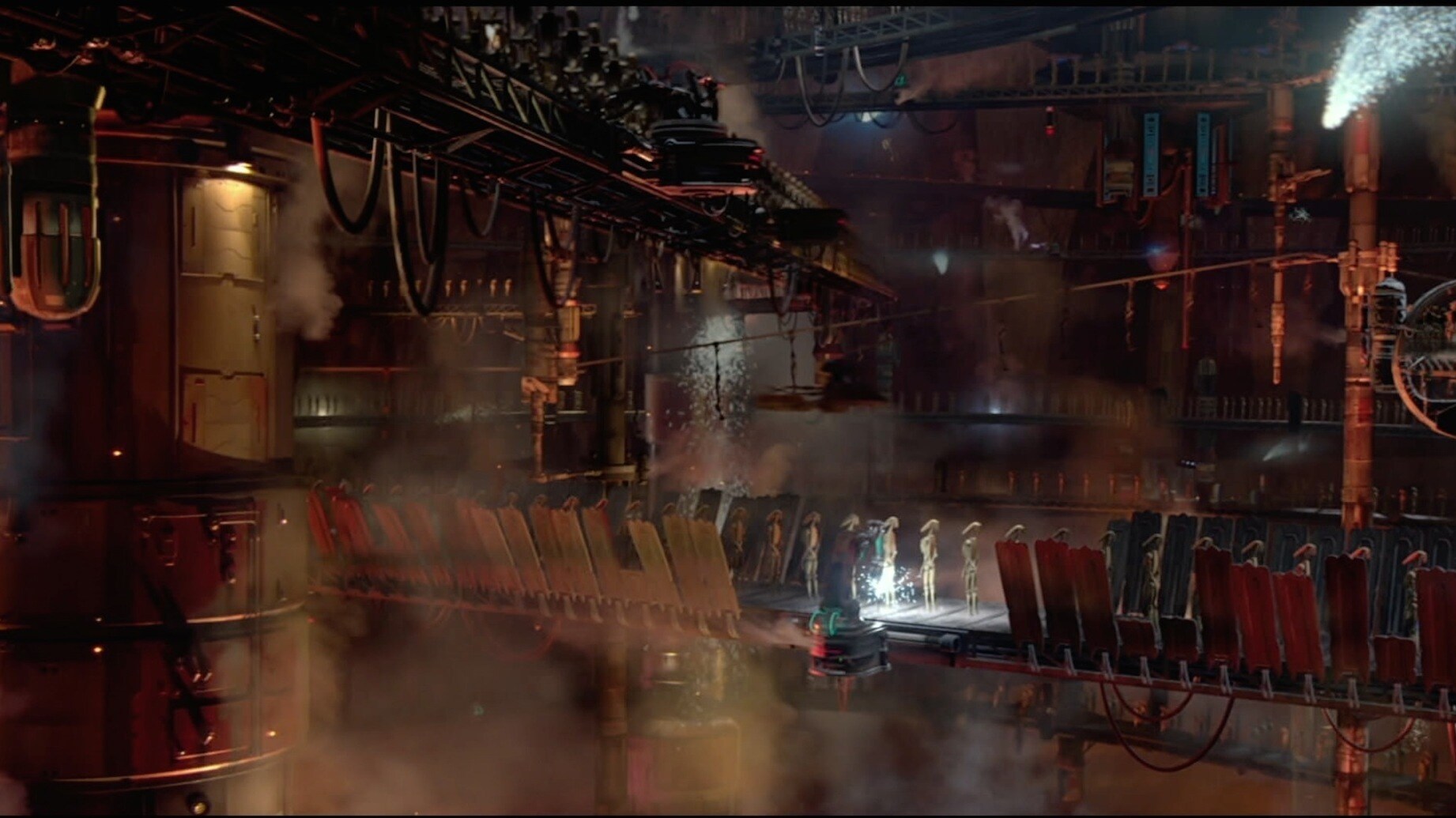
(Continuing from this post.)
Now we are going to go the last step that I've alluded to in previous posts this week. We're going to industrialize.
All of this talk of clone vats, magic food dispensers, holographic transmission/storage/security, etc. all requires that a high-level Magic-User be around that knows Enchant An Item, Permancey, and either know or have others collaborate with him that know the relevant spells- and that they do this from scratch for each item made.
What if the Magic-User made an item that could make other items?
"Buh? That's impossible."
In a game with Alter Reality, Miracle, and Wish as player-accessible spells nothing is impossible. Therefore it stands to reason that someone, somewhere is going to (a) have this idea and (b) attempt to pull it off. Like with cloning, provisions, and communications the first to succeed has made a game-winning play.
How It's Done
Mindset: You are not designing a stand-alone widget. You are designing a machine. The machine is going to have a heavy cost to construct up-front, but once it is complete all that you will need to do is feed it materials, select what to make, flip the switch (metaphorically speaking) on and walk away.
Process: You are making several sub-systems and assembling them together. The core of the machine casts Enchant An Item and Permanency. Other subsystems shall consist of modules or addons that contain the ability to cast other spells; these are to be swapped out as required. A complete system will have a controller subsystem that holds all of the item creation patterns, secures them against unauthorized access, and contacts the machine's creator/owner when a process is complete.
The first step is the core subsystem. This is a stable platform upon which the base item(s) are placed for enchanting; upon activation it used Enchant An Item to being the process of creation and (if required) ends the process with Permanency.
The second step is the creation of a mechanism by which an array of modules or addons can be stored, installed, and removed.
The third step is to create an array of modules for commonly-requested enchantments (Flametonque, +X vs. Y targets, Detect (X), etc.) capable of using those spells upon command.
The fourth step is to assemble the subsystems together into a complete machine. Your industrialized enchantment factory is usable at this point.
The final step is to collaborate with an Illusionist to create a synthetic illusory persona to automate the machine and operate it in place of the creator/owner.
In addition, collaborating with others able to use magics that he cannot (i.e. other spell-casters) allows the creation of additional modules/addons to make items that the Magic-User alone cannot.
If enchantment is not required, but rather ordinary manufacture (see above picture), then all you need is to make low-grade automata that can do each part of the making process ceaselessly to a prescribed degree of quality- use of Wall of (X) spells can even obviate the need to feed it raw materials.
"But no one would do that."
We live in a world where that does exist, and the real-world analogue to such spell-casters--academics--routinely pawn off tedious bitchwork to their student assistents. If they could install a reliable artificial persona to do grunt work, they would (and will) in a heartbeat.
And "making yet another +1 longsword" is the definition of bitchwork for a Magic-User capable of creating one.
The Magic-User becomes an architect and designer; the tedium of item creation gets pushed off on to a purpose-created automaton capable of doing what the design prescribes.
Note that all of this plays into the archetype of the Magic-User as the Master of Cosmic Knowledge, able to wield the power of the gods to achieve his wordly ends- as Promethean as it gets.
All this without touching the one item that always gets more gamers to screech like howling monkeys than anything else: firearms.
Again, once this is done it is nigh-impossible to undo because it grants such a massive advantage to those that have it and is so difficult to destroy without wielding equal or superior power.
And man, doesn't the implied milieu of the game look like exactly that: the aftermath of a highly-advanced and industrialized civilization destroyed by equal or superior power.
Figuring out how to make airships, to arm them with cannon, and to mass-produce both of them (i.e. things found in Barsoom) is a logical consequence of all of this.
Again, AD&D is Thundarr. Embrace the weirdness, thrive in it, and you too can come to #winatrpgs.
No comments:
Post a Comment
Anonymous comments are banned. Pick a name, and "Unknown" (et. al.) doesn't count.